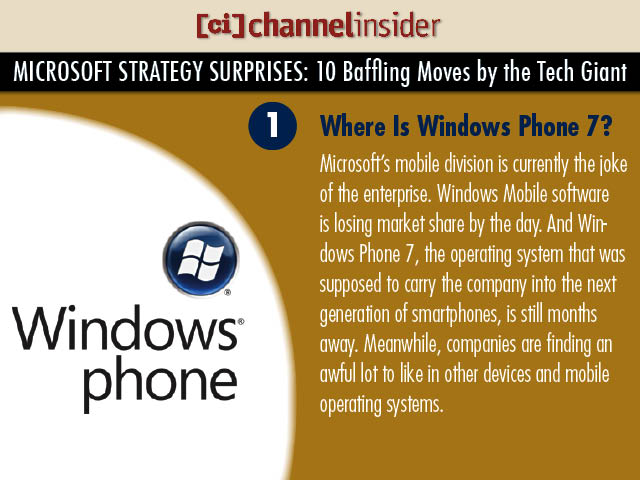 Microsoft Strategy Surprises 10 Baffling Moves by the Tech Giant
Microsoft Strategy Surprises 10 Baffling Moves by the Tech Giant
1. Where Is Windows Phone 7?Microsoft’s mobile division is currently the joke of the enterprise. Windows Mobile software is losing market share by the day. And Windows Phone 7, the operating system that was supposed to carry the company into the next generation of smartphones, is still months away. Meanwhile, companies are finding an awful lot to like in other devices and mobile operating systems.
 No Title
No Title
2. Allowing Google to Enter the EnterpriseA couple years ago, Google only made its market in the corporate world by way of search and advertising. Today, the company’s mobile operating system is on its way to the enterprise-focused Cius tablet from Cisco. It’s also running on smartphones that companies are increasingly adopting. Meanwhile, Microsoft is missing out. Who would have thought that Microsoft would have allowed that to happen?
 No Title
No Title
3. Windows 7Windows 7 may be selling far better than Windows Vista did, but the corporate world is still trying to figure out why it should adopt Microsoft’s new operating system. And all the while, Microsoft isn’t really helping it out. That’s especially surprising. In the past, Microsoft knew what it needed to do in order to be successful and it went after corporate customers the right way. Today, the company does nothing of the sort. And it’s a mistake that will have far-reaching effects.
 No Title
No Title
4. The WebInstead of doing what it must to be successful with the Internet, Microsoft continues to miss the point. Buying second-rate companies like Powerset or aQuantive is never a good idea when Google has bought the bigger, better alternatives. And with its advertising platform still years behind, it’s quickly becoming clear that Microsoft is a little lost on the Web.
 No Title
No Title
5. The Great Battle With HPOne of the biggest surprises of 2010 is Microsoft’s battle with HP. Microsoft CEO Steve Ballmer announced at CES in January Microsoft would work with HP to deliver a Windows 7-based slate. But when HP bought Palm and announced a WebOS tablet, that seemed like a dead deal. Recently, rumors claim the Windows tablet is still on the table. Exactly what’s going on is anyone’s guess. But the break in the typically good rapport between HP and Microsoft speaks to the state of Microsoft’s business right now.
 No Title
No Title
6. Its ForgetfulnessMicrosoft has forgotten what it takes to be successful in the enterprise. Yes, Windows is still a major player in the corporate world and Office is important to almost any organization’s business. But elsewhere, Microsoft has lost its influence. It seems to have forgotten what made it so successful in the enterprise in the first place, and instead is engaging in poor business practices to hold off the competition. It’s not working. And it’s making it worse for the company the longer it waits.
 No Title
No Title
7. Decision-MakingThe decision making of Microsoft’s executives from Steve Ballmer and the down is becoming more suspect by the day. From waiting to bring out Windows Phone to Vista errors to its questionable strategy for the cloud is becoming an issue. Ballmer needs to take a step back, fully evaluate the industry, and start making better decisions. Microsoft was once the most feared company in the industry. Now, it’s a shadow of its former self.
 No Title
No Title
8. A VisionOne of the hallmarks of Microsoft’s operation, thanks to Bill Gates, was its vision. But Microsoft has lost that vision, and in so doing, it has failed to adequately see what it should be doing next to stay successful. For corporate customers that have historically relied upon Microsoft, it’s disconcerting. If Microsoft doesn’t have vision, how can it be expected to continue to know what it needs to do in the corporate world?
 No Title
No Title
9. Foiling RIMRIM has proven to be a major thorn in Microsoft’s side. The mobile company looked at the enterprise market, evaluated the issues, and created a better product and service. When one considers Microsoft’s past, it’s surprising RIM was able to beat Microsoft here. The company has a proven track record of stopping small companies from stealing significant market share before it’s too late. And yet, RIM’s growth flies in the face of that.
 No Title
No Title
10. Thinking About ApplePerhaps the biggest surprise related to Microsoft and the enterprise is the company’s inability to stop Apple. For more than a decade, Microsoft was able to keep Apple at bay and ensure that it capitalized on the hardware company’s problems. Nowadays, it’s quite the opposite. Although Apple was once the afterthought in the tech business, Microsoft is quickly taking that crown.

